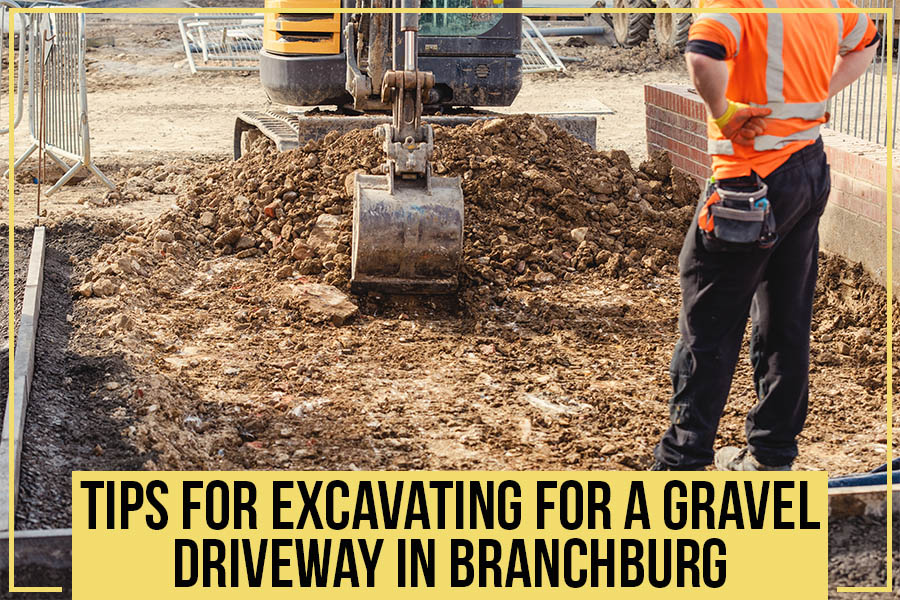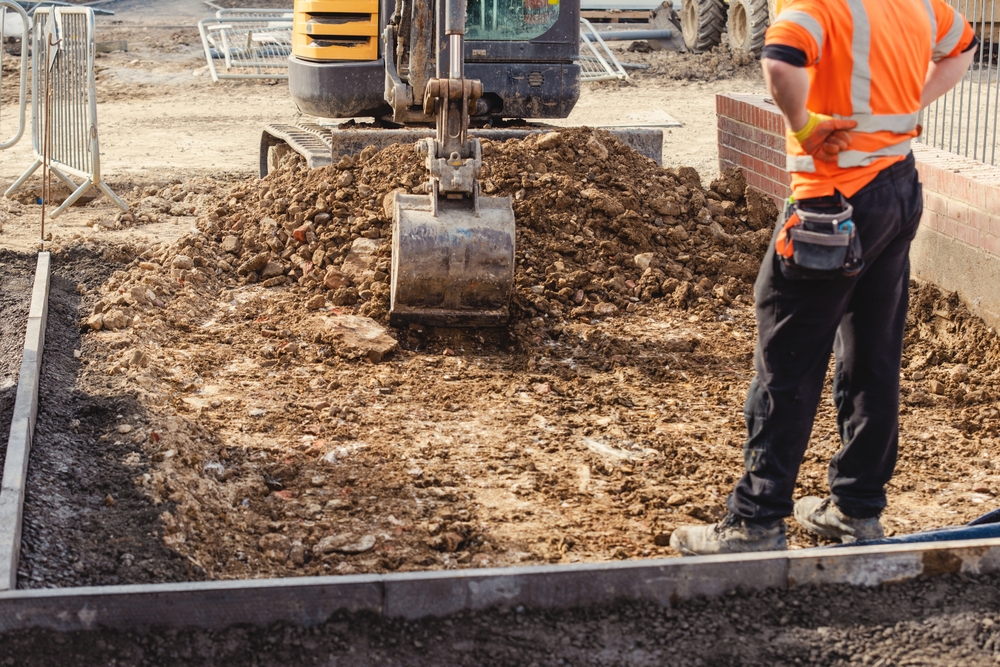
Key takeaways:
- A driveway footprint helps to determine the amount of gravel needed for the job
- The excavation process begins with the removal of topsoil
- Once the subsoil is reached, the gravel is excavated
- Multiple layers of gravel may be necessary to achieve the desired thickness
- Only a professional excavation contractor should be hired to complete the job
You’ve finally saved up enough money to buy a house in the country. The perfect country home includes a gravel driveway. But there’s one problem: you don’t know how to excavate a gravel driveway. Do you need a backhoe? A bulldozer? How deep should the hole be? What kind of equipment do you need to rent? And how much gravel do you need to order?
If you’re excavating for a gravel driveway in Branchburg, never fear! Here are some tips from your friends at Purcell’s Paving and Masonry.
1. Begin with Excavating the Driveway Footprint
The best strategy would be to hire an excavation contractor due to their experience and expert knowledge. The need for heavy equipment also makes it necessary to do so.
Whichever path you take, footprint excavation is the first and foremost task. This involves clearing the ground of obstacles, such as grass, stumps, large rocks, and other objects that can get in the way. It would be best to remove at least 8 to 10 inches of topsoil for a gravel driveway. However, a recommended strategy is to ensure the depth is the same as the thickness.
2. Consider the Land’s Soil
Your property’s soil has much to do with the gravel driveway excavation process. The kind of earthmoving equipment that will be used during the excavation is dependent on the soil’s composition. For instance, a backhoe might be the best excavation tool if the soil is too hard. If the ground is too soft, an excavator will suffice.
Whether your soil is silty or clay material, and whether it’s gravel or sandy, all of these details matter a lot. A contractor will be able to properly assess your land and determine the best driveway excavation process for you.
3. Subgrade Preparation
After stripping the land of all unwanted materials, it is time to test its strength. Your excavation contractor will “proof-roll” the site with a heavy machine to test the subgrade’s ability to support the gravel driveway.
If the subgrade is too weak, gravel will eventually sink into the soil, causing dips and depressions. The contractor will probably recommend adding stone or other materials to improve the strength of the subgrade.
Sometimes, adding a crown to the driveway (higher in the center than at the edges) will also facilitate drainage.
4. Geotextile Placement
Geotextile filter fiber is placed over the subgrade to keep gravel from sinking into the soil. The contractor will unroll, cut the fabric to fit, and then secure it with gravel or soil staples.
The addition of geotextile also depends on the soil you’re dealing with. For example, clay is often regarded as “bad” soil because it doesn’t allow water to pass through readily. Adding geotextile, in this case, can help you avoid problems down the road. However, these requirements are not always necessary in the case of sand or gravel.
5. Don’t Forget Driveway Edging
Without adequately defined borders, you cannot have a gravel driveway. The gravel will inevitably spill over your lawn, creating an unsightly and difficult-to-maintain mess. Driveway edging comes in various varieties, including concrete, plastic, metal, brick, and stone. Choose the material that best suits your needs, style, and budget.
With driveway edging, you can prevent the gravel from moving around, and your excavation will look neater and better organized.
6. Multiple Layers of Gravel
When excavating for gravel, you need to make sure that you create multiple layers. The gravel should be four inches deep, with the bottom layer being the most significant gravel piece. The second layer should be smaller gravel pieces, and the top layer should have the tiniest ones.
People opt for multiple layers to increase sturdiness and minimize gravel movement. By having multiple layers, you are less likely to have gravel pieces sink into the ground and create an uneven surface.
7. Consider the Weather
One crucial factor to consider when excavating for gravel is the weather. If it rains a lot, the ground will be softer and wetter, making excavation more difficult. Now, remember what we said about the soil particular to your property. Suppose the soil is already loose and sandy. In that case, you may consider postponing your gravel excavation until the ground has dried out.
8. Make Sure You Have the Right Equipment
Driveway excavation is not a DIY job, at least not if you want it done right. Not only do you need the right tools for the job, but you also need the experience and the know-how to use them. Professionals require machinery ranging from hand tools to hydraulic excavators, depending on the size and scope of your gravel driveway project.
9. Know Where to Put the Dirt
After excavating your gravel driveway, you will have a lot of dirt left over. Which is why having a plan for where to put it is essential. One option is to use it to build up the sides of your driveway, creating a berm. By doing this, you can reduce how much gravel you need for your driveway and also help to control runoff.
10. Trust Only a Professional
Excavating your driveway is no joke. And now that you understand that it’s not a DIY project, you need to find a reputable excavation contractor to do the job. We recommend getting multiple references before you decide on a company.

Ending Note:
If you’re looking to install a gravel driveway in Branchburg, these tips should help make the process go as smoothly as possible. By excavating correctly and using the right materials, you can avoid some of the most common problems people experience. So, if you’re ready to start your new driveway, follow these tips!
We’re Your Friendly Excavation Contractor in Branchburg
At Purcell’s Paving and Masonry, we have the skills, experience, and materials to expertly complete your gravel driveway excavation in Branchburg, NJ. We also have the right team of experts to help you choose what gravel is best for your project and to excavate your land properly.


